71% of recruiters say it's harder to evaluate the quality of alternative credentials than college degrees
With college degrees becoming more expensive, job seekers are increasingly turning to more affordable alternative credentials to grow and obtain proof of their knowledge instead. A 2021 study by SHRM found that nearly half of U.S. workers (45%) have some form of an alternative credential, and among those who don't, nearly half (49%) have considered earning one.[1]
Certificates, digital badges, and other "alt creds" are flooding job applications and resumes, which presents a problem for recruiters trying to evaluate talent for their employer. Not only do recruiters need to reconfigure their application process to better capture these alt creds, but with over one million possible credentials that job seekers can acquire, they also face the difficult task of trying to distinguish good alt creds from bad or fake ones.[2]
Our survey of 300 recruiters in the U.S.* sheds some light on how employers are valuing and validating alt credits, and how recruiters and HR leaders can navigate this potential hiring minefield.
/ Key findings
Employers are dropping college degree requirements: 41% have removed college degree requirements from some job openings in the past year.
Most recruiters say alt creds have standalone value: 48% say alt creds can be a worthy substitute for a college degree for some jobs, while 5% say alt creds can be a worthy substitute for all jobs.
Assessing alt creds is difficult: 43% of recruiters say they "sometimes" or "always" don't recognize an alt cred when it appears on an applicant's resume, and 71% agree that it is harder to evaluate the quality of an alt cred than a college degree.
Recruiters are less diligent about validating alt creds: Compared to 86% of recruiters that contact colleges directly or ask the applicant to submit a copy of their college degree for verification, only 76% do the same for alt creds.
As enrollment declines, employers are second-guessing college degree requirements
For decades, college degrees have been the credential of choice for employers and job seekers alike. But with the average cost of a four-year degree from a public college increasing 64% from 2000 to 2020—and median earnings for workers with a degree failing to keep pace over the same timespan— job seekers are starting to question if a degree is still a worthwhile investment.[3] The 8% decline in undergraduate college enrollment from 2019 to 2022 is the steepest on record.[4]
With a college degree more out of reach for applicants than ever, and employers struggling to fill important roles, we find that many businesses are softening their stance on having degree requirements in their job openings. In our survey, 41% of recruiters say their employer has removed college degree requirements from at least some job openings in the past year, and another 6% say their employer plans to remove degree requirements from openings by 2030.
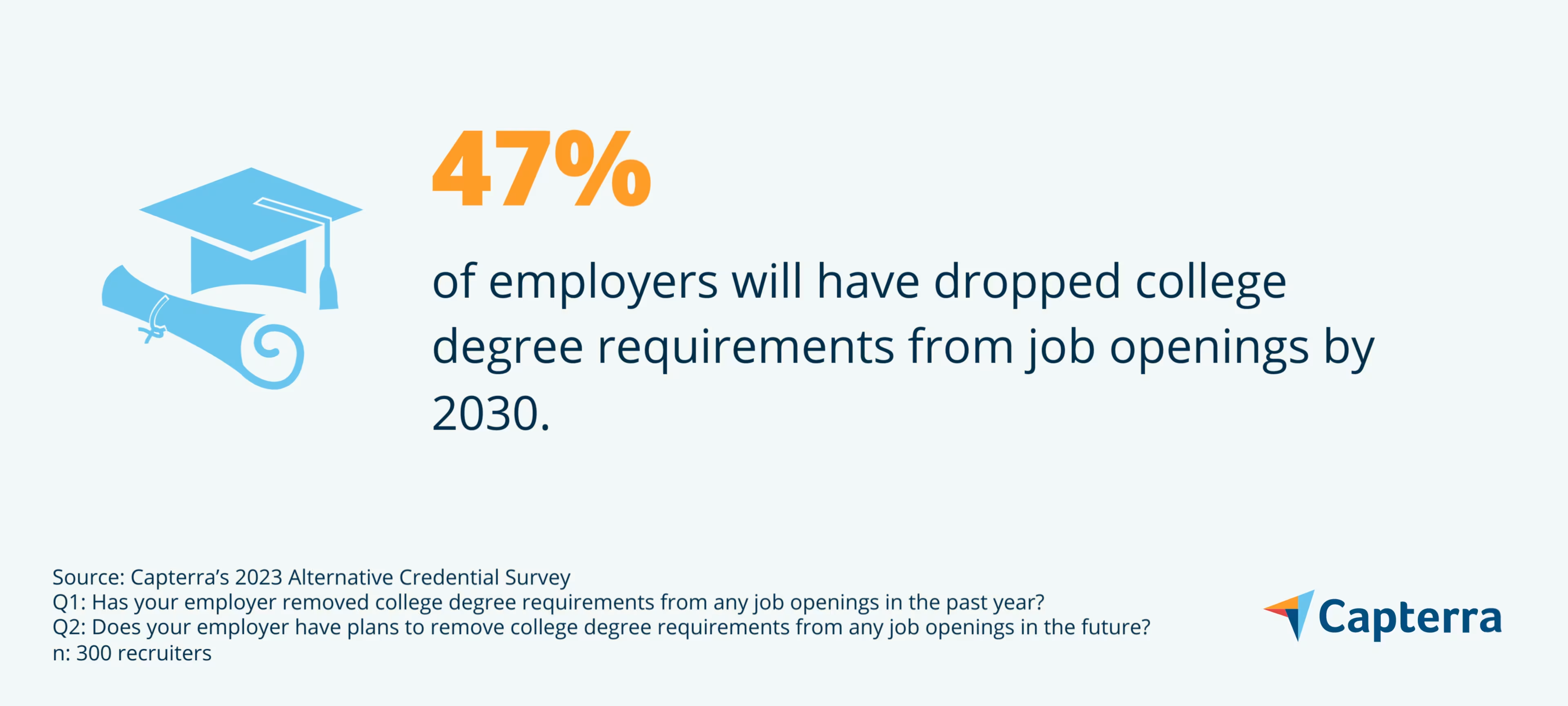
That's not to say that college degrees don't still hold significant value in landing a job—in the next section we'll show that they absolutely do. But employers are starting to realize that by removing the high hurdle of a college degree from their application process, they can grow their applicant pool without a significant dip in candidate quality.
And our data supports this conclusion. When asked to give all the reasons they're removing degree requirements, 74% of recruiters say it's to make their hiring process more equitable, while 53% say they've had success hiring good employees who don't hold a college degree.
Alt creds hold standalone value for some jobs, recruiters say
At the same time that the market for college degrees has been on the decline, the alt cred market has exploded. From 2018 to 2020, the number of unique credentials in the U.S. nearly tripled.[1]
It's not hard to understand why job seekers love alt creds as a shortcut to bolstering their resume—they are often more affordable, more specialized, and less time-consuming to acquire. And with 96% of recruiters in our survey saying they've had at least one applicant submit a resume with an alt cred on it in the past year, it's clear that alt creds aren't a rare sight when evaluating candidates.
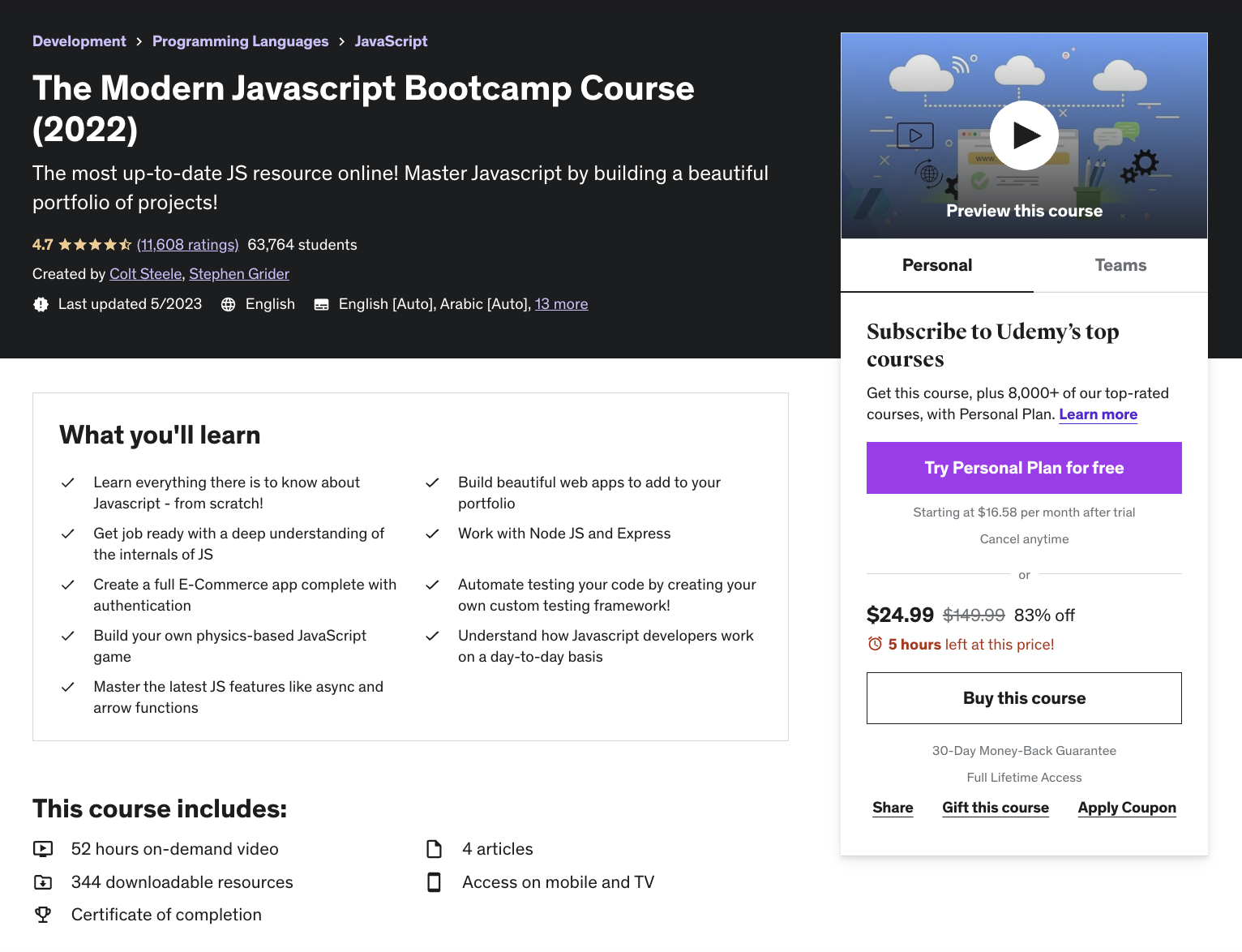
An example of an alternative credential course on Udemy[5]
None of this matters in the employment world, though, if recruiters don't believe that alt creds represent viable proof of knowledge or expertise in a specific area. Fortunately, this is not the case according to our data.
When asked for their opinion on the value of alternative credentials when evaluating a job candidate, 48% of the recruiters in our survey say alt creds can be a worthy substitute for a college degree for some jobs, while 5% go as far as to say alt creds can be a worthy substitute for all jobs. Only 10% believe alt creds hold no value, even when paired with a degree.
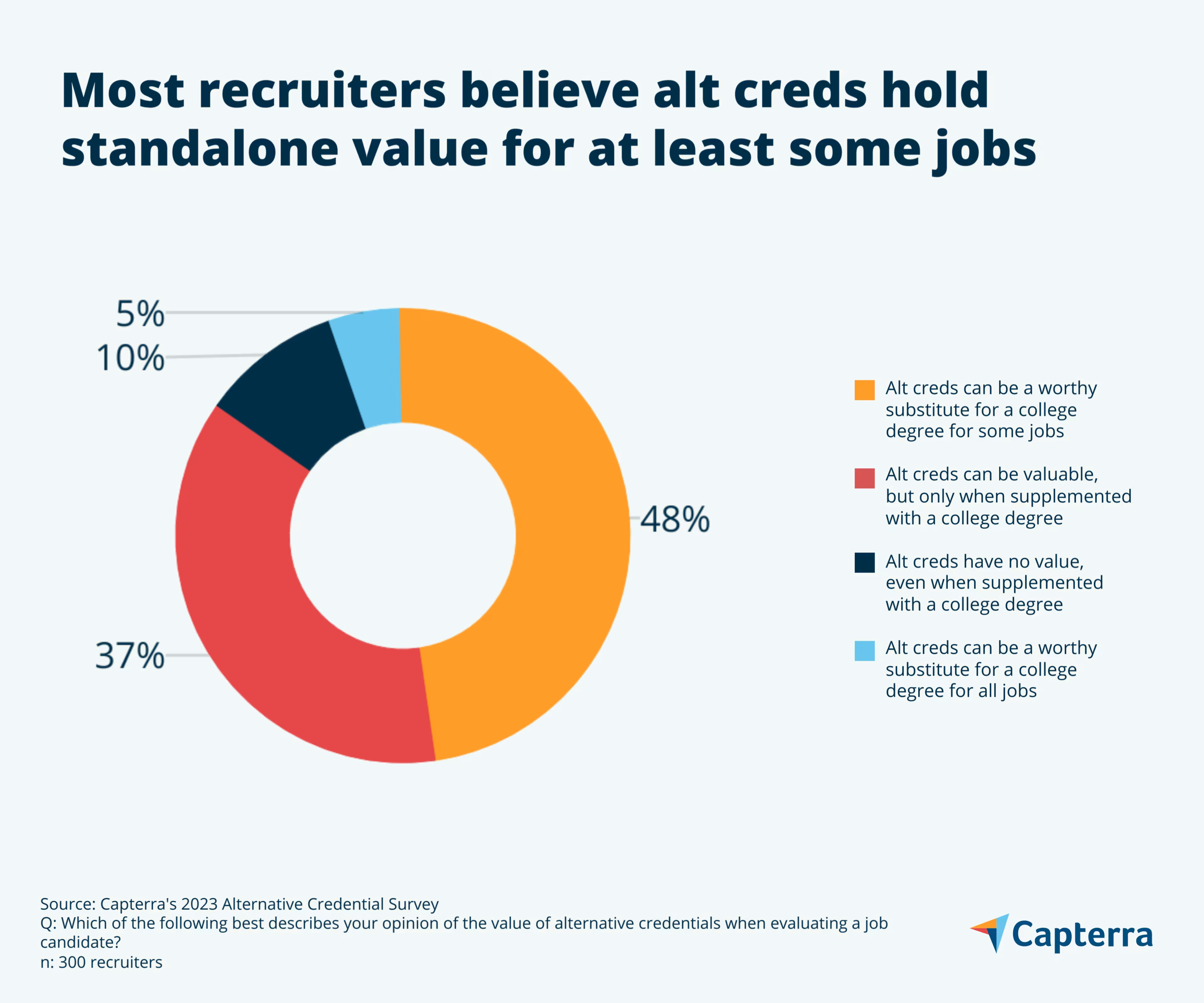
Recruiters even say they actually prefer alt creds for certain roles.
We asked the respondents to rank five different credentials—a college degree, a professional certification, a training completion certificate, a course completion certificate, and a digital badge—from most valuable to least valuable when evaluating job candidates for different categories of roles. While more recruiters rank a college degree as the most valuable credential for most roles, we did find two exceptions: IT and sales/customer service jobs. For these roles, recruiters most often rank a professional certification as the most valuable credential.
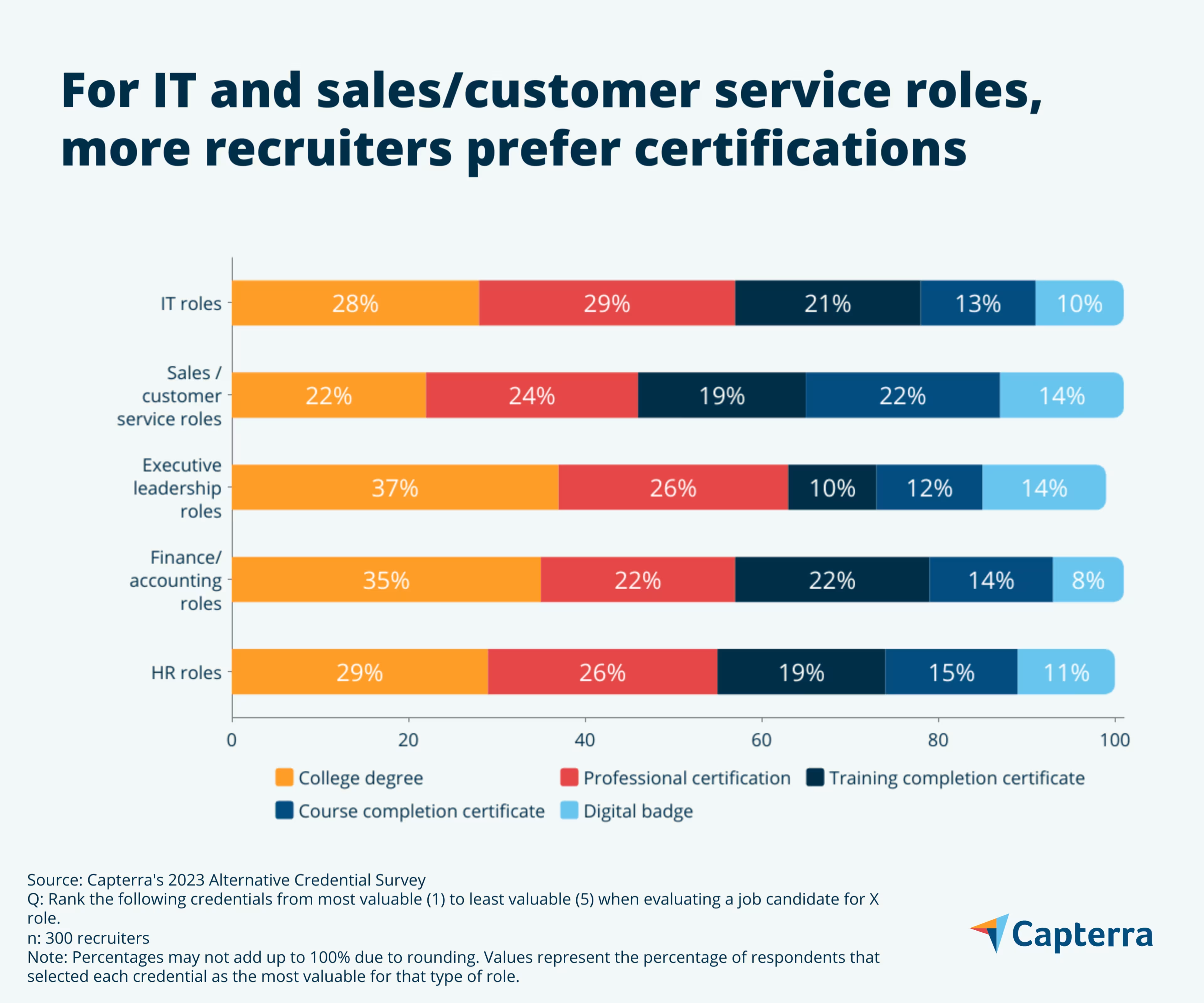
IT roles in particular offer a case study in the rise in prominence of alt creds. With colleges and universities failing to provide adequate and up-to-date IT education, coding bootcamps—which are mostly run by for-profit companies—have become the go-to path for learning new programming languages and skills. Valued at $1.4 billion as of 2021, the global coding bootcamp market is expected to reach $3.7 billion by 2027.[6]
Recruiters face challenges with alt cred verification
For job hunters that are banking their employability on alt creds, the combination of employers dropping college degree requirements and recognizing the educational value of alt creds is good news. But for overwhelmed recruiters trying to wade through mountains of applications quickly, alt creds present two distinct challenges.
Recognizing an alt cred: Compared to the nearly 4,000 accredited colleges and universities that offer degrees, there are over one million unique alternative credentials, and growing. Because of this, 43% of recruiters in our survey admit they "sometimes" or "always" don't recognize an alt cred when it appears on an applicant's resume—requiring further investigation into its authenticity.
Discerning a good alt cred from a bad one: Recruiters can refer to the U.S. Department of Education's "Database of Accredited Postsecondary Institutions and Programs," or DAPIP, to check the veracity of a college's accreditations, but there's no such governing body they can turn to for alt creds. Recruiters instead have to rely on more dicey methods to assess an alt cred's quality, like user reviews.
As a result of these challenges, 71% of recruiters in our survey agree that it is harder to evaluate the quality of an alternative credential than a college degree. And while this should motivate recruiters to be more diligent in ensuring applicants have the alt creds they say they have, we instead find the opposite. Compared to 86% of recruiters that contact colleges directly or ask the applicant to submit a copy of their college degree for verification, only 76% do the same for alt creds.
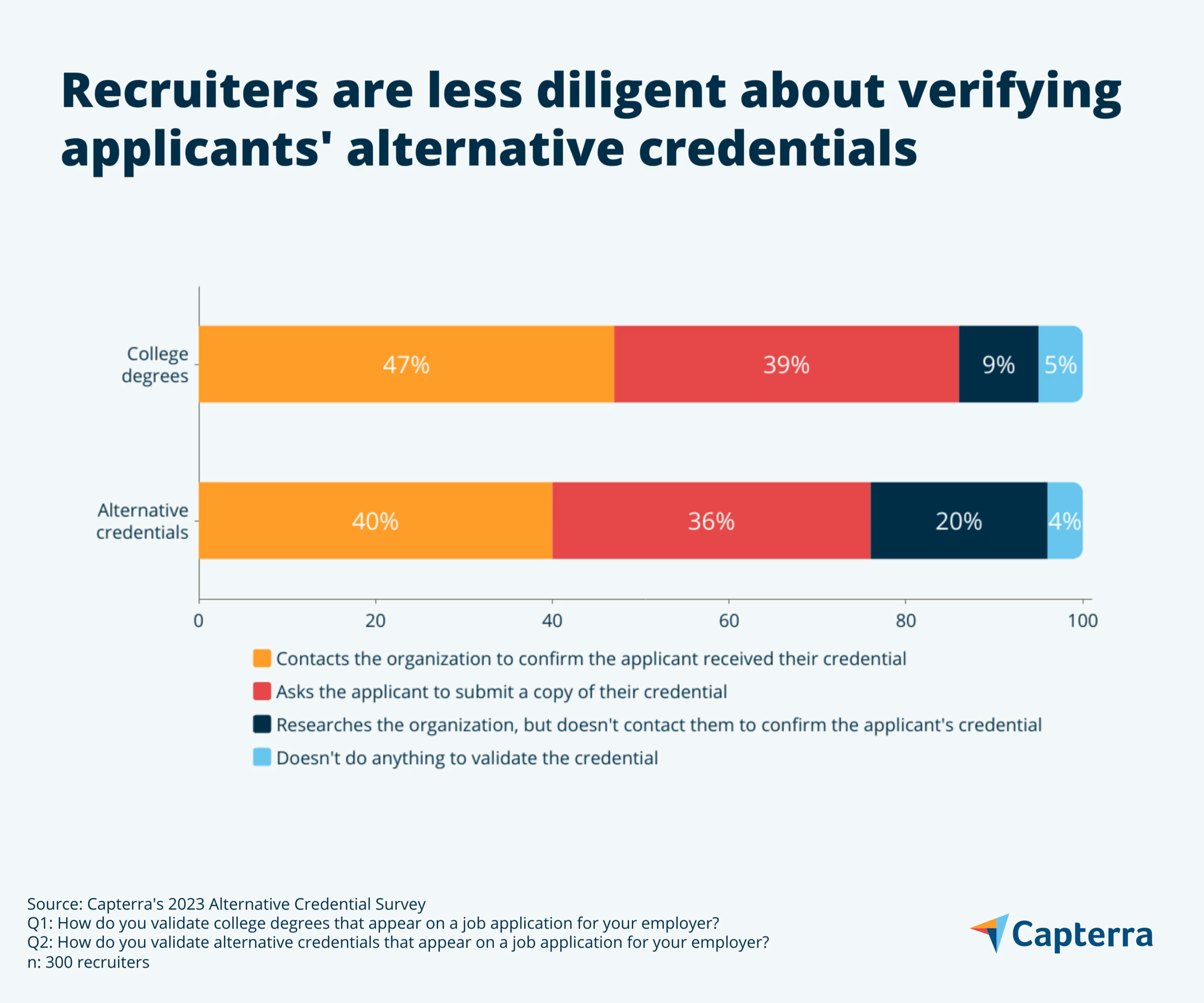
Resume fraud is already a major problem in recruiting circles. A survey last year of over 1,000 Americans found that 93% of people knew someone who had lied on their resume.[7] So if recruiters don't find a way to get a better handle on the influx of alt creds, the risk of hiring someone with a bad or fake credential that lacks the skills and knowledge to do their job is high.
Alt creds aren't going anywhere—here's how recruiters can adapt
With 77% of recruiters in our survey expecting to receive more applications with alternative credentials over time, the clock is ticking for HR departments to improve how they track and validate alt creds. Here are three recommendations to get you started:
1. Have a dedicated field for alt creds in your application process
In our survey, we find that alt creds are sometimes treated as second-class citizens during the job application process. As opposed to 75% of recruiters who either have a specific field where applicants can enter their college degree(s) or a way to automatically pull them after applicants upload their resume, only 67% have either of these workflows in place for alt creds.
By adjusting the job application workflow using your applicant tracking system (ATS) to allow applicants to enter their alt creds into a specific field, you can not only improve the candidate experience, but also better capture alt creds over time. Once you've evaluated the quality of a new alt cred for the first time, you can then leave a note about it in your ATS for the rest of your recruiting team—speeding up candidate assessment in the future.
Is your current ATS leaving a lot to be desired? Check out Capterra's Shortlist of the top applicant tracking systems here.
2. Collaborate with hiring managers to harness their alt cred knowledge
If you're looking for a good place to start building your alt cred knowledge, look no further than your hiring managers. Hiring managers know a lot about the top alt creds in their field, especially ones that may be popular but not up-to-par education-wise.
In our survey, 87% of recruiters say they've already met with hiring managers or other knowledgeable employees at their organization to learn more about reputable alternative credentials in their field. If you're part of the 13% that haven't, get meetings on the calendar soon.
3. Decide as a team which factors separate good alt creds from bad ones
Of course, hiring managers won't know about every alt cred in their field, and it's inevitable that alt creds will show up on applications that you or your team have never seen.
That's why it's important that everyone be on the same page regarding what separates a good alt cred from a bad one. If the criteria for alt cred evaluation differs between recruiters, candidate quality in the interview stage will be all over the place.
For context, we asked recruiters in our survey which factor they think is the most important in separating a good alt cred from a bad one. The reputation of the organization offering the alt cred (38%) and the amount of instructor-led teaching involved in earning the alt cred (20%) are the top answers. While it's easier to research the latter than the former, some online sleuthing can give you a sense if an alt cred is valuable or not (for example, a Google search of any semi-popular alt cred will usually yield helpful, neutral-party blogs and forum discussions about its quality).
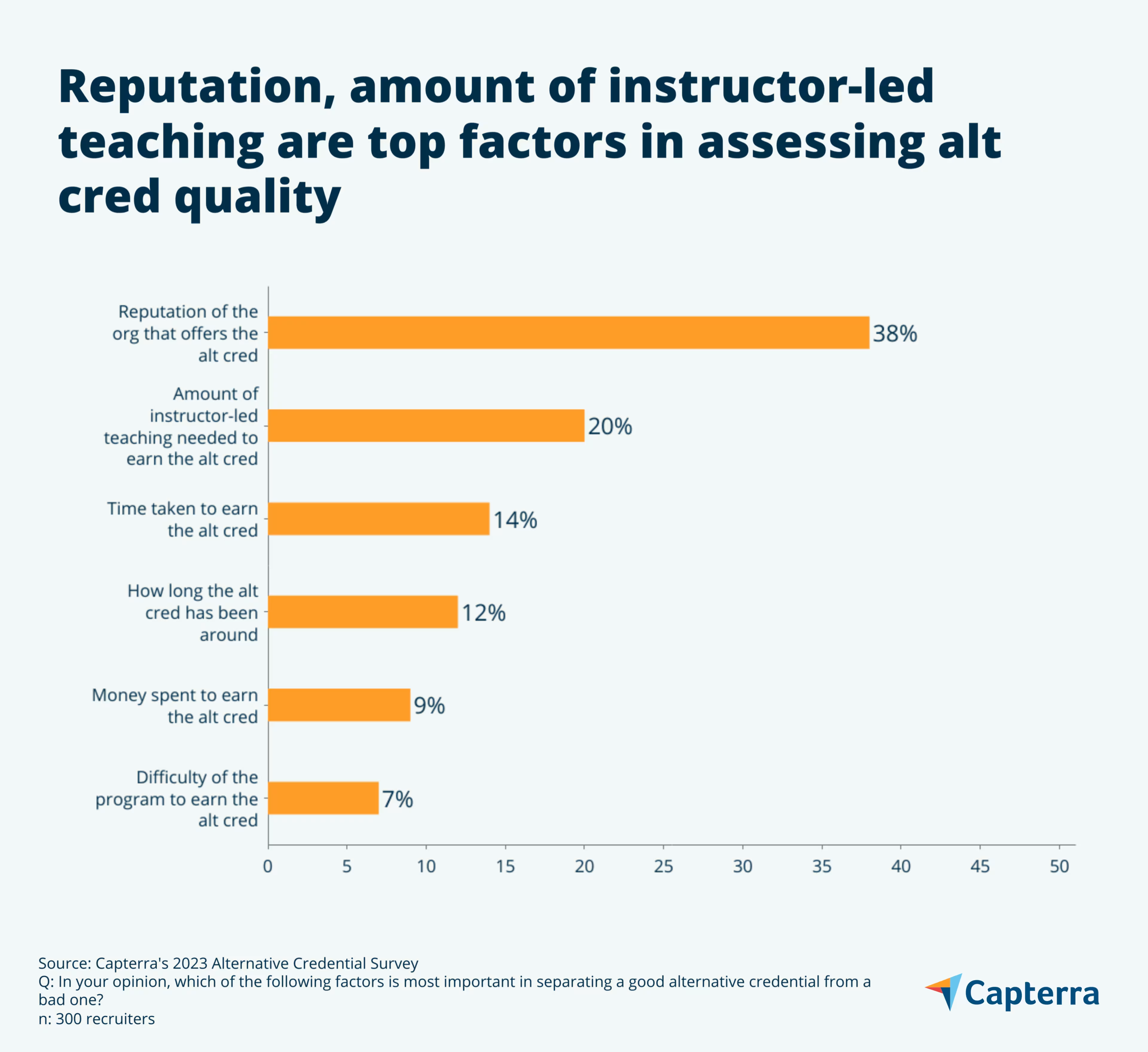
With the industry struggling to keep pace, it's on recruiters to become alt cred masters
The alt cred industry is aware of its validation struggles. Between burgeoning alternative credential networks like the University Professional and Continuing Education Association (UPCEA) and efforts to develop a blockchain-enabled certificate verification protocol, there are a number of promising solutions happening in collaboration with schools, alt cred organizations, and technology providers to agree on industry-wide standards.
But for now, that's all they are: promising. Until alt cred governing bodies and standards are formalized and firmly in place, it's on you as a recruiter to grow your alt cred knowledge and decide as an employer how you're going to value and validate this growing form of education.
If you liked this report, check out these other recruiting resources:
